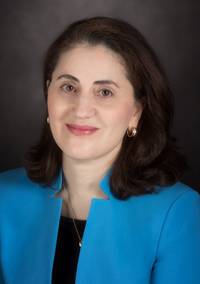
05 Mar Non-Small Cell Lung Cancer: Liquid Biopsy Pinpoints Treatment Options
MedicalResearch.com Interview with:

Dr. Papadimitrakopoulou
Vassiliki Papadimitrakopoulou, MD
Professor of Medicine
Department of Thoracic/Head and Neck Medical Oncology
MD Anderson Cancer Center in Houston
MedicalResearch.com: What is the background for this study? What are the main findings?
Response: 30% of patients with newly diagnosed advanced NSCLC can be treated successfully with targeted therapies, often yielding higher response rates than chemotherapy or immune checkpoint inhibitors. Selecting first-line therapy for patients with NSCLC requires assessment of an expanding list of guideline-recommended genomic biomarkers (EGFR, ALK, ROS1, BRAF, RET, MET amplification and exon 14 skipping, and ERBB2, with NTRK newly added)
Standard-of-care (SOC) testing relies on tissue, which is limited by biopsy-related risks, specimen insufficiency, and lab processing duration, which hamper timely optimal treatment selection
– NILE is a large, prospective, multicenter, head-to-head study of SOC tissue-based genomic testing to plasma-based comprehensive cfDNA genomic testing (Guardant360®). For the four biomarkers with FDA approved therapies, up to 34% of patients were tested by SOC tissue testing versus 95% with cfDNA testing. NILE met its primary endpoint – cfDNA performed similar to tissue in the detection of guideline-recommended biomarkers and cfDNA results were delivered significantly faster than SOC tissue testing (median 9 days vs. 15 days).Using cfDNA testing first, 87% of patients with a guideline-recommended biomarker would have been detected, compared to 67% if SOC tissue testing was first.
MedicalResearch.com: What should readers take away from your report?
Response: A highly sensitive and specific liquid biopsy, such as Guardant360, should be part of the standard of care at the time of diagnosis in patients with newly diagnosed, advanced NSCLC. First because when we find a drug target with a sensitive liquid biopsy we can be confident that it will be present in tissue and we know that that liquid biopsy finds drug targets at similar levels to standard tissue genotyping, opening more treatment opportunities for patients.
MedicalResearch.com: What recommendations do you have for future research as a result of this work?
Response: Several clinical trials are already exploring use of cfDNA as a screening tool for trial eligibility, additional aspects of cfDNA research include monitoring of responses to immunotherapy, detecting and monitoring minimal residual disease, early detection of disease recurrence and hopefully in the future early detection of cancer.
MedicalResearch.com: Is there anything else you would like to add?
Response: The results from this study definitively answer the question of whether targetable biomarkers can be detected at a similar rate to that when utilizing tissue for genotyping and demonstrate that liquid biopsy can overcome several of the issues associated with suboptimal genotyping utilizing tumor tissue such as having insufficient tumor material (or exhausting the material when tissue testing is done in sequential manner).
I have several disclosures
Please see what fits your journal format and please see below:
Advisory board: Nektar Therapeutics, AstraZeneca, Arrys Therapeutics, Merck, LOXO Oncology, Araxes Pharma, F Hoffman-La Roche, Janssen Research Foundation, Bristol-Myers Squibb, Clovis Oncology, Eli Lilly, Novartis, Takeda, Abbvie, TRM Oncology, Tesaro, Exelixis, Nektar, Gritstone, Arrys, Guardant Health.
Speaker/Preceptorship: F Hoffman La Roche.
Research support: Eli Lilly, Novartis, Merck, AstraZeneca, F Hoffman-La Roche, Nektar Therapeutics, Janssen, Bristol-Myers Squibb, Checkmate, Incyte, Guardant Health.
Citation:
American Association for Cancer Research
[wysija_form id=”3″]
[last-modified]
The information on MedicalResearch.com is provided for educational purposes only, and is in no way intended to diagnose, cure, or treat any medical or other condition. Always seek the advice of your physician or other qualified health and ask your doctor any questions you may have regarding a medical condition. In addition to all other limitations and disclaimers in this agreement, service provider and its third party providers disclaim any liability or loss in connection with the content provided on this website.
Last Updated on March 5, 2019 by Marie Benz MD FAAD
